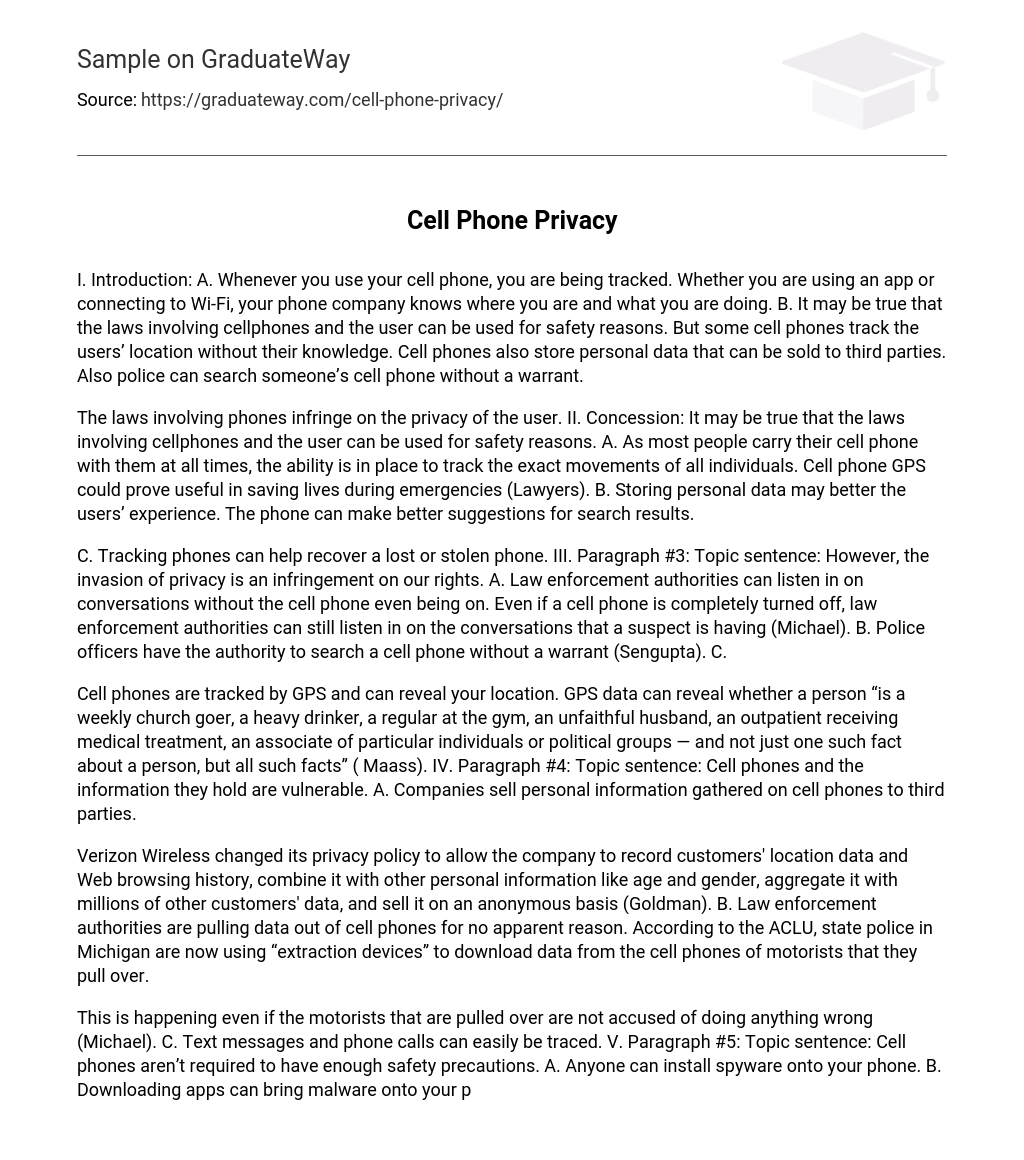I. Introduction: A. Whenever you use your cell phone, you are being tracked. Whether you are using an app or connecting to Wi-Fi, your phone company knows where you are and what you are doing. B. It may be true that the laws involving cellphones and the user can be used for safety reasons. But some cell phones track the users’ location without their knowledge. Cell phones also store personal data that can be sold to third parties. Also police can search someone’s cell phone without a warrant.
The laws involving phones infringe on the privacy of the user. II. Concession: It may be true that the laws involving cellphones and the user can be used for safety reasons. A. As most people carry their cell phone with them at all times, the ability is in place to track the exact movements of all individuals. Cell phone GPS could prove useful in saving lives during emergencies (Lawyers). B. Storing personal data may better the users’ experience. The phone can make better suggestions for search results.
C. Tracking phones can help recover a lost or stolen phone. III. Paragraph #3: Topic sentence: However, the invasion of privacy is an infringement on our rights. A. Law enforcement authorities can listen in on conversations without the cell phone even being on. Even if a cell phone is completely turned off, law enforcement authorities can still listen in on the conversations that a suspect is having (Michael). B. Police officers have the authority to search a cell phone without a warrant (Sengupta). C.
Cell phones are tracked by GPS and can reveal your location. GPS data can reveal whether a person “is a weekly church goer, a heavy drinker, a regular at the gym, an unfaithful husband, an outpatient receiving medical treatment, an associate of particular individuals or political groups — and not just one such fact about a person, but all such facts” ( Maass). IV. Paragraph #4: Topic sentence: Cell phones and the information they hold are vulnerable. A. Companies sell personal information gathered on cell phones to third parties.
Verizon Wireless changed its privacy policy to allow the company to record customers’ location data and Web browsing history, combine it with other personal information like age and gender, aggregate it with millions of other customers’ data, and sell it on an anonymous basis (Goldman). B. Law enforcement authorities are pulling data out of cell phones for no apparent reason. According to the ACLU, state police in Michigan are now using “extraction devices” to download data from the cell phones of motorists that they pull over.
This is happening even if the motorists that are pulled over are not accused of doing anything wrong (Michael). C. Text messages and phone calls can easily be traced. V. Paragraph #5: Topic sentence: Cell phones aren’t required to have enough safety precautions. A. Anyone can install spyware onto your phone. B. Downloading apps can bring malware onto your phone. The new Android malware disguises itself in fully functional copies of apps, including “Angry Birds Space,” and hides its malicious payload in the string of code at the end of an otherwise genuine JPEG file (Liebowitz). C. Apps are tracking your location when it is unnecessary.
Apps such as the “Brightest Flashlight”, “Angry Birds”, and “Shazam” are able to track location even though they have no need to do so (Sullivan). VI. Conclusion: There is not enough laws protecting the privacy of a cell phone and its’ user. Whenever you turn your phone on, there is a database that keeps tabs on where you are, whenever you make a call and hear static in the background, is it just noise or are you being eavesdropped on by the law? When will the intrusion on privacy stop, how soon until our government wants to implant a microchip in all of us? The world is changing, and all of us better wake up.





